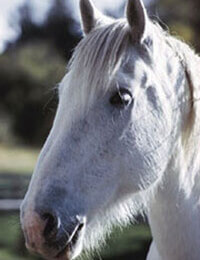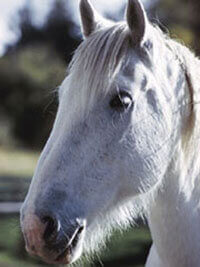Each state’s animal protection ordinances outline basic requirements for animal care. But a comprehensive understanding of the variables that can affect a horse’s health and safety is necessary for a thorough investigation. Horses should have the following:
Clean Water
Horses kept in pastures should have access to a water tank, ideally in the shade. (If kept in the sun, algae will grow, rendering the water undrinkable.) Tanks should be heated in winter and should always contain a large rock or log for small animals to climb out on. (Horses will refuse to drink from a tank into which an animal has fallen.) A horse kept in a stall should have access to at least one 5-gallon, clean water bucket or an automatic waterer at all times. Tanks, buckets, and waterers should be scrubbed and rinsed daily with baking soda. (This is especially important in the summer.)
Nutritious Food
Horses should be fed one-half bale of greenish-colored hay (grass, alfalfa, or a mix) each day (approximately 2 percent of their body weight). A horse forced to compete for food may need to be fed separately so that more aggressive horses in the the “pecking order” don’t leave him or her starving. Yellow, dusty, moldy, smelly hay or hay with fine dust, flakes, or clumps of plant matter may cause colic, respiratory problems, or even starvation, should the horse refuse to eat it. Regardless of the hay’s quality, it should be stored away from the horse’s stall to avoid respiratory problems caused by its dust. A dietary supplement of grains, oats, or sweet feed should be given twice each day, ideally at the same time every day. A salt block should be available at all times.
Shelter
A windbreak, a shed, or a clean and dry run-in area of a barn should be available at all times. The horse’s bedding should be made of bright and clean straw, wood shavings (not walnut, which is toxic to horses),or sawdust. Stalls should be cleaned daily and should not smell of ammonia (its fumes can damage horses’ lungs). No more than five droppings should be accumulated in one stall. (Immaculate stalls can mean that horses are eating their own feces in order to supplement their diet.)
Hoof and Tooth Care
Horses’ feet should be picked daily to clear away pebbles and debris, which can cause painful bruises or “thrush,” a painful bacterial infection. Shod horses need to have their shoes reset and their hooves trimmed every six weeks by a farrier. Barefoot horses should have their hooves trimmed every eight weeks. Horses’ teeth should be “floated,” or filed, by a veterinarian once every year. If left untended, teeth will become sharp and chewing so painful that a horse may refuse to eat.
Veterinary Care
Horses should be on a cyclical parasite-control program and should receive twice-a-year inoculations, including influenza, rhinopneumotitis, eastern and western strains of encephalomyelitis, and tetanus. Vaccinations may vary depending on geographical location, level of activity, and travel. Stall-kept horses should receive at least one hour of exercise and fresh air every day.
Safe Surroundings
The manure pile, where droppings are temporarily disposed of, should not be able to be seen or smelled from the horse’s stall or shelter and should be cleared from the property at least once every month. The pasture should be free of debris. Fences should be checked regularly for stability and strength.







